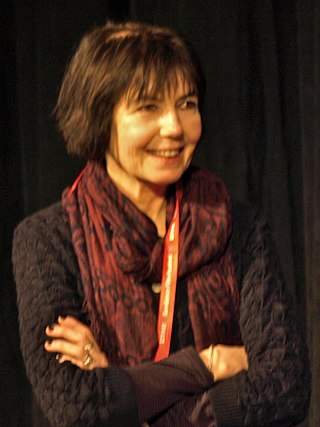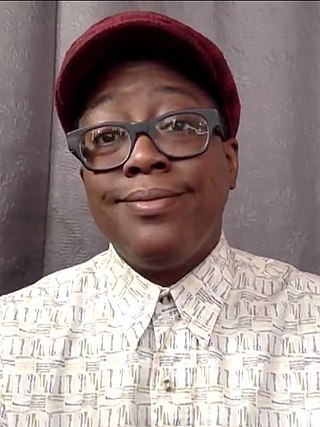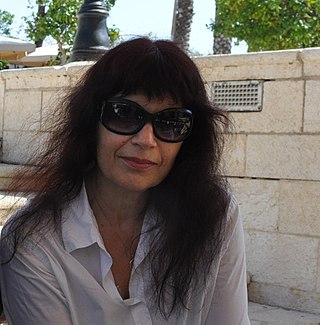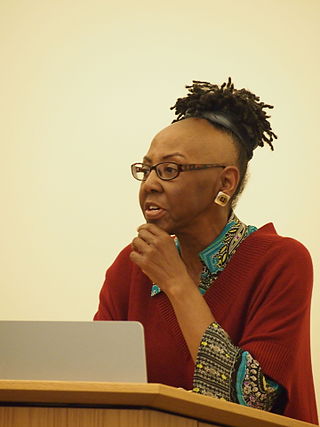
Barbara Jean Hammer was an American feminist film director, producer, writer, and cinematographer. She is known for being one of the pioneers of the lesbian film genre, and her career spanned over 50 years. Hammer is known for having created experimental films dealing with women's issues such as gender roles, lesbian relationships, coping with aging, and family life. She resided in New York City and Kerhonkson, New York, and taught each summer at the European Graduate School.

Kim Longinotto is a British documentary film maker, well known for making films that highlight the plight of female victims of oppression or discrimination. Longinotto has made more than 20 films, usually featuring inspiring women and girls at their core. Her subjects have included female genital mutilation in Kenya, women standing up to rapists in India, and the story of Salma, an Indian Muslim woman who smuggled poetry out to the world while locked up by her family for decades.

Wheeler Winston Dixon is an American filmmaker and scholar. He is an expert on film history, theory and criticism. His scholarship has particular emphasis on François Truffaut, Jean-Luc Godard, American experimental cinema and horror films. He has written extensively on numerous aspects of film, including his books A Short History of Film and A History of Horror. From 1999 through the end of 2014, he was co-editor, along with Gwendolyn Audrey Foster, of the Quarterly Review of Film and Video. He is regarded as a top reviewer of films. In addition, he is notable as an experimental American filmmaker with films made over several decades, and the Museum of Modern Art exhibited his works in 2003. He taught at Rutgers University, The New School in New York, the University of Amsterdam in the Netherlands, and as of May 2020, is the James E. Ryan professor emeritus of film studies at the University of Nebraska in Lincoln.

Gwendolyn Audrey Foster is an experimental filmmaker, artist and author. She is Willa Cather Professor Emerita in Film Studies. Her work has focused on gender, race, ecofeminism, queer sexuality, eco-theory, and class studies. From 1999 through the end of 2014, she was co-editor along with Wheeler Winston Dixon of the Quarterly Review of Film and Video. In 2016, she was named Willa Cather Endowed Professor of English at the University of Nebraska at Lincoln and took early retirement in 2020.
Donna Deitch is an American film and television director, producer, screenwriter, and actor best known for her 1985 film Desert Hearts. The movie was the first feature film to "de-sensationalize lesbianism" by presenting a lesbian romance story with positive and respectful themes.
Joyce Chopra is an American director.

Cheryl Dunye is a Liberian-American film director, producer, screenwriter, editor and actress. Dunye's work often concerns themes of race, sexuality, and gender, particularly issues relating to black lesbians. She is known as the first out black lesbian to ever direct a feature film with her 1996 film The Watermelon Woman. She runs the production company Jingletown Films based in Oakland, California.

The Watermelon Woman is a 1996 American romantic comedy-drama film written, directed, and edited by Cheryl Dunye. The first feature film directed by a black lesbian, it stars Dunye as Cheryl, a young black lesbian working a day job in a video store while trying to make a film about Fae Richards, a black actress from the 1930s known for playing the stereotypical "mammy" roles relegated to black actresses during the period.
Pratibha Parmar is a British writer and filmmaker. She has made feminist documentaries such as Alice Walker: Beauty in Truth (2014) and My Name is Andrea (2022) about Andrea Dworkin.

Nitrate Kisses is a 1992 experimental documentary film directed by Barbara Hammer. According to Hammer, it is an exploration of the repression and marginalization of LGBT people since the First World War. To celebrate the 30th anniversary of the Teddy Awards, the film was selected to be shown at the 66th Berlin International Film Festival in February 2016.

Thomas Allen Harris is a critically acclaimed, interdisciplinary artist who explores family, identity, and spirituality in a participatory practice. Since 1990, Harris has remixed archives from multiple origins throughout his work, challenging hierarchy within historical narratives through the use of pioneering documentary and research methodologies that center vernacular image and collaboration. He is currently working on a new television show, Family Pictures USA, which takes a radical look at neighborhoods and cities of the United States through the lens of family photographs, collaborative performances, and personal testimony sourced from their communities..
Ngozi Onwurah is a British-Nigerian film director, producer, model, and lecturer. She is best known as a filmmaker for her autobiographical film The Body Beautiful (1991) and her first feature film, Welcome II the Terrordome (1994). Her work is reflective of the unfiltered experiences of Black Diaspora in which she was raised.
Greta Schiller is an American film director and producer, best known for the 1984 documentary Before Stonewall: The Making of a Gay and Lesbian Community and the 1995 documentary Paris Was a Woman.

Michal Bat-Adam is an Israeli film director, producer, screenwriter, actress, and musician. Her films deal with complex and conflicted relationships, especially relationships within families. She also explores the line between sanity and mental illness. Many of these movies contain autobiographical elements.

Michelle Parkerson is an American filmmaker and academic. She is an assistant professor in Film and Media Arts at Temple University and has been an independent film/video maker since the 1980s, focusing particularly on feminist, LGBT, and political activism and issues.

Goodbye in the Mirror is a 1964 black-and-white experimental film produced and directed by Storm de Hirsch.
Khush is a 1991 British short film directed by Pratibha Parmar. It portrays lesbians and gay men from India and other parts of Asia, discussing their coming out and their acceptance and embracing of their sexuality. Khush also discusses homosexuality in the Indian diaspora.
Barbara McCullough is a director, production manager and visual effects artist whose directorial works are associated with the Los Angeles School of Black independent filmmaking. She is best known for Water Ritual #1: An Urban Rite of Purification (1979), Shopping Bag Spirits and Freeway Fetishes: Reflections on Ritual Space (1980), Fragments (1980), and World Saxophone Quartet (1980).
Lisa Rinzler is an American cinematographer who works on both feature films and documentaries. She has worked with Wim Wenders, Martin Scorsese, the Hughes Brothers and Tamra Davis.










